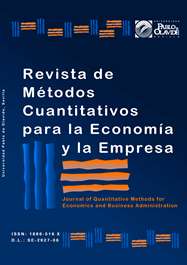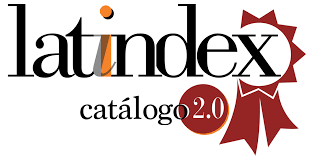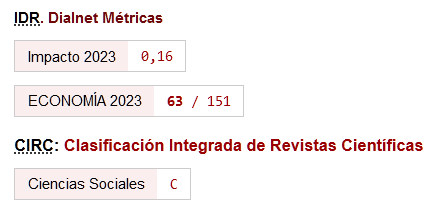A Six Sigma Approach to Assessing the Quality of Higher Education in Colombia
DOI:
https://doi.org/10.46661/revmetodoscuanteconempresa.5313Keywords:
Six Sigma, higher education, learning analytics, continuous improvement, educational qualityAbstract
University institutions face challenges of competitiveness derived from the demands of society, changes in student preferences, and technological evolution; this raises the need to generate objective tools for decision-making to identify the institutions that are effectively contributing to the training of high-level professionals. In this research, a methodology is developed under the Six Sigma approach to measuring the performance of the educational system. Now, to evaluate the methodology, data from the Colombian test for the evaluation of quality in higher education in the area of engineering are used. The results show that the sigma level of the Colombian education system is at Z= 2.17 and a performance Y= 75%, which according to the criteria established in the research is considered an acceptable level. As a significant contribution of the study, a structure for the evaluation, monitoring, and improvement of university education using the Six Sigma approach is presented. The proposed structure is replicable and reproducible to any educational environment where standardized tests are implemented
Downloads
References
Antony, J. (2014). Readiness factors for the Lean Six Sigma journey in the higher education sector. International Journal of Productivity and Performance Management, 63(2), 257-264. https://doi.org/10.1108/IJPPM-04-2013-0077
Antony, J., Krishan, N., Cullen, D., & Kumar, M. (2012). Lean Six Sigma for higher education institutions (HEIs): Challenges, barriers, success factors, tools/techniques. International Journal of Productivity and Performance Management, 61(8), 940-948. https://doi.org/10.1108/17410401211277165
Bumjaid, S.E., & Malik, H.A.M. (2019). The Effect of Implementing of Six Sigma Approach in Improving the Quality of Higher Education Institutions in Bahrain (SSRN Scholarly Paper ID 3540883). Social Science Research Network. https://papers.ssrn.com/abstract=3540883
Delahoz-Domínguez, E., Guillen-Ibarra, S., & Fontalvo-Herrera, T. (2020). Análisis de la acreditación de calidad en programas de ingeniería industrial y los resultados en las pruebas nacionales estandarizadas, en Colombia. Formación universitaria, 13(1), 127-134. https://doi.org/10.4067/S0718-50062020000100127
Delahoz-Domínguez, E.J., Fontalvo, T.J., & Fontalvo, O.M. (2020). Evaluación de la calidad del servicio por medio de seis sigma en un centro de atención documental en una universidad. Formación universitaria, 13(2), 93-102. https://doi.org/10.4067/S0718-50062020000200093
Delahoz-Domínguez, E., Zuluaga, R., & Fontalvo-Herrera, T. (2020). Dataset of academic performance evolution for engineering students. Data in Brief, 30, 105537. https://doi.org/10.1016/j.dib.2020.105537
Felizzola, H., & Luna, C. (2014). Lean Six Sigma en pequeñas y medianas empresas: Un enfoque metodológico. Ingeniare. Revista Chilena de Ingeniería, 22(2), 263-277. https://doi.org/10.4067/S0718-33052014000200012
Gamal, M. (2011). Reconstructing Six Sigma barriers in manufacturing and service organizations: The effects of organizational parameters. International Journal of Quality & Reliability Management, 28(5), 519-541. https://doi.org/10.1108/02656711111132562
Hien, N.M. (2014). A Study on Evaluation of E-Government Service Quality, 8(1), 4, 16-19.
Hsieh, Y.-J., Huang, L.-Y., & Wang, C.-T. (2012). A framework for the selection of Six Sigma projects in services: Case studies of banking and health care services in Taiwan. Service Business, 6(2), 243-264. https://doi.org/10.1007/s11628-012-0134-1
ICFES (2019). Guia de orientacion modulos de competencias genericas saber-pro 2019. ICFES. https://www.icfes.gov.co/documents/20143/1518930
ICFES (2020). Bases de datos-Portal Icfes. Bases de datos, Instituto Colombiano para la Evaluación de la Educación - ICFES. https://www.icfes.gov.co/web/guest/investigadores-y-estudiantes-posgrado/acceso-a-bases-de-datos#Acceso%20a%20bases%20de%20datos%20y%20diccionarios
Ishak, A., Siregar, K., Asfriyati, & Naibaho, H. (2019). Quality Control with Six Sigma DMAIC and Grey Failure Mode Effect Anaysis (FMEA): A Review. IOP Conference Series: Materials Science and Engineering, 505, 012057. https://doi.org/10.1088/1757-899X/505/1/012057
Lee, H., & Kim, C. (2014). Benchmarking of service quality with data envelopment analysis. Expert Systems with Applications, 41(8), 3761-3768. https://doi.org/10.1016/j.eswa.2013.12.008
LeMahieu, P.G., Nordstrum, L.E., & Cudney, E.A. (2017). Six Sigma in education. Quality Assurance in Education, 25(1), 91-108. https://doi.org/10.1108/QAE-12-2016-0082
Lima, P.N.D., Dresch, A., & Lacerda, D.P. (2019). Do socio-economic contextual factors influence SMEs’ service quality A cross-sector and cross-city SERVPERF analysis. International Journal of Business Performance Management, 20(3), 195-211. https://doi.org/10.1504/IJBPM.2019.101998
Lu, J., Laux, C., & Antony, J. (2017). Lean Six Sigma leadership in higher education institutions. International Journal of Productivity and Performance Management, 66(5), 638-650. https://doi.org/10.1108/IJPPM-09-2016-0195
Maguad, B. A., & Krone, R. M. (2012). Managing for Quality in Higher Education. Bookboon.
Nadeau, S. (2017). Lean, Six Sigma and Lean Six Sigma in Higher Education: A Review of Experiences around the World, 13, 591-603. https://doi.org/10.4236/aji.
Navas, R.K.B., Akash, R.P., Sathish, G., & Azharudeen, J.M. (2016). Six Sigma in Education: Examination Result Analysis Using Six Sigma - A Case Study. 2016 IEEE 4th International Conference on MOOCs, Innovation and Technology in Education (MITE), 245-250. https://doi.org/10.1109/MITE.2016.056
Pineda, P., & Celis, J. (2017). ¿Hacia la universidad corporativa? Reformas basadas en el mercado e isomorfismo institucional en Colombia. Education Policy Analysis Archives, 25, 71. https://doi.org/10.14507/epaa.25.2837
Ramanan, L., & Kumar, D.M. (2013). SIX SIGMA - DMAIC Framework for Enhancing Quality in Engineering Educational Institutions. Six Sigma, 3(1), 36-40.
Schroeder, R.G., Linderman, K., Liedtke, C., & Choo, A.S. (2008). Six Sigma: Definition and underlying theory⋆. Journal of Operations Management, 26(4), 536-554. https://doi.org/10.1016/j.jom.2007.06.007
Shokri, A. (2014). Six Sigma in Supply Chain. En U. Ramanathan & R. Ramanathan (Eds.), Supply Chain Strategies, Issues and Models (pp. 63-98). Springer London. https://doi.org/10.1007/978-1-4471-5352-8_4
Song, H.G., & Lim, S.U. (2015). Assessing pet industry in Korea using service quality improvement gap model. International Journal of Technology, Policy and Management, 15(1), 2-20. https://doi.org/10.1504/IJTPM.2015.067791
Subbarayalu, A.V., & Al Kuwaiti, A. (2017). Development of a six sigma rating scale for measuring the quality of work life of teaching staff working in Saudi Universities. International Journal for Quality Research, 11(2), 397-418. https://doi.org/10.18421/IJQR11.02-10
Suman, G., & Prajapati, D.R. (2018). Statistical analysis of the researches carried out on Lean and Six Sigma applications in healthcare industry. International Journal of Quality Engineering and Technology, 7(1), 1. https://doi.org/10.1504/IJQET.2018.094667
Sunder M.V., & Antony, J. (2018). A conceptual Lean Six Sigma framework for quality excellence in higher education institutions. International Journal of Quality & Reliability Management, 35(4), 857-874. https://doi.org/10.1108/IJQRM-01-2017-0002
Surange, V.G. (2015). Implementation of Six Sigma to Reduce Cost of Quality: A Case Study of Automobile Sector. Journal of Failure Analysis and Prevention, 15(2), 282-294. https://doi.org/10.1007/s11668-015-9927-6
Suresh, K.M., Asokan, P., & Vinodh, S. (2016). Application of design for Six Sigma methodology to an automotive component. International Journal of Six Sigma and Competitive Advantage, 10(1), 1-23. https://doi.org/10.1504/IJSSCA.2016.080446
Svensson, C., Antony, J., Ba-Essa, M., Bakhsh, M., & Albliwi, S. (2015). A Lean Six Sigma program in higher education. International Journal of Quality & Reliability Management, 32(9), 951-969. https://doi.org/10.1108/IJQRM-09-2014-0141
Torres, M., & Vásquez, C.L. (2018). Modelos de evaluación de la calidad del servicio: caracterización y análisis. Revista Científica Compendium, 18(35), 57-76.
Visbal-Cadavid, D.A., Martínez-Gómez, M., & Escorcia-Caballero, R. (2020). Exploring University Performance through Multiple Factor Analysis: A Case Study. Sustainability, 12(3), 1-23. https://doi.org/10.3390/su12030924
Zambrano, N., & Alá, A. (2014). Implementación de la metodología seis sigma para el mejoramiento continuo del proceso de venta de servicios tecnológicos y comunicacionales en Ecuadortelecom S.A. http://dspace.ups.edu.ec/handle/123456789/6863
Zare, Y. (2011). Six‐Sigma: Methodology, tools and its future. Assembly Automation, 31(1), 79-88. https://doi.org/10.1108/01445151111104209
Downloads
Published
How to Cite
Issue
Section
License

This work is licensed under a Creative Commons Attribution-ShareAlike 4.0 International License.
Submission of manuscripts implies that the work described has not been published before (except in the form of an abstract or as part of thesis), that it is not under consideration for publication elsewhere and that, in case of acceptance, the authors agree to automatic transfer of the copyright to the Journal for its publication and dissemination. Authors retain the authors' right to use and share the article according to a personal or instutional use or scholarly sharing purposes; in addition, they retain patent, trademark and other intellectual property rights (including research data).
All the articles are published in the Journal under the Creative Commons license CC-BY-SA (Attribution-ShareAlike). It is allowed a commercial use of the work (always including the author attribution) and other derivative works, which must be released under the same license as the original work.
Up to Volume 21, this Journal has been licensing the articles under the Creative Commons license CC-BY-SA 3.0 ES. Starting from Volume 22, the Creative Commons license CC-BY-SA 4.0 is used.










